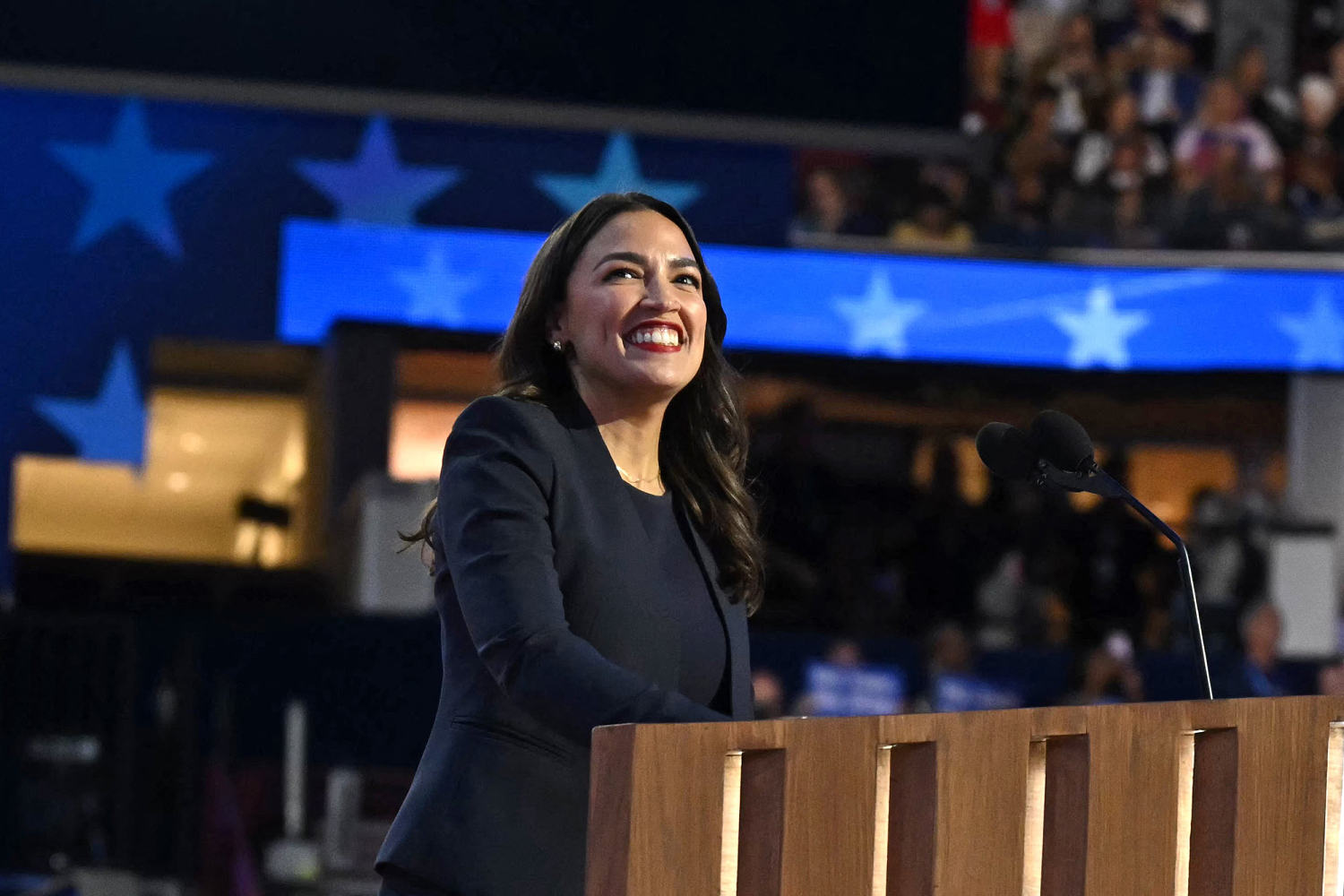
At the 2020 Democratic National Convention, Rep. Alexandria Ocasio-Cortez, D-N.Y., got 90 seconds to speak. Ocasio-Cortez was then a freshman lawmaker who’d toppled a 10-term Democratic incumbent with a left-wing campaign that shocked the party and the country. Her speech, delivered on the second night of that convention, was about rallying progressives and seconding the presidential nomination of Sen. Bernie Sanders, I-Vt. It was a symbolic move because he had lost his presidential campaign, his second one, in the primaries. She spoke about her loyalty to a “mass people’s movement,” which she said was needed to address the “brutality” of the economy, recognize “colonialism” and propose “deep systemic solutions.” She was speaking at a convention for the party, but her remarks were aimed at the party’s shortcomings.
Ocasio-Cortez’s speech Monday night couldn’t have been more different.
She was given seven minutes during a prime-time slot on opening night. She introduced herself as a former waitress but made no mention of her background as a left-wing political organizer. She wasn’t sounding a dissenting note about a failed insurgency; instead, she was firing up the crowd for the nominee, Vice President Kamala Harris, and Harris’ running mate, Minnesota Gov. Tim Walz. Gone was the talk about a mass movement; Ocasio-Cortez focused on the health and the future of the Democratic Party, including winning not just the White House, but majorities in both chambers of Congress. While Ocasio-Cortez spoke about class divisions, the rhetoric was dialed down, more in line with the party establishment’s generic conception of the wealthy versus the rest. Ocasio-Cortez’s praise for Harris for being “for the middle class because she is from the middle class” made her sound more like a centrist Democrat than a member of the Democratic Socialists of America. Monday night’s Ocasio-Cortez had grown into a creature of the establishment, both for better and for worse.
The contrast between her two DNC appearances illustrates Ocasio-Cortez’s swift ascendance within the party.
The contrast between her two DNC appearances illustrates Ocasio-Cortez’s swift ascendance within the party. Ocasio-Cortez remains the leading voice of “the Squad,” the most progressive bloc of lawmakers in the House. But her collaboration with President Joe Biden during his time in office — during which he governed further to the left on social spending and climate policy than anyone expected — has resulted in her evolution from gadfly to strategic progressive partner for the party. She serves as an advocate and surrogate for certain sectors of the left within the party, but simultaneously maintains increasingly strong ties with the upper echelons of the party. She did not play hardball with Biden with defections from his bills as he compromised on progressive legislation to win over conservatives in the party.
And in the most striking display of her change to date, Ocasio-Cortez, alongside Sanders, argued for Biden to remain the party’s presidential nominee even as the party establishment turned on him after his fateful June debate performance against former President Donald Trump. Ocasio-Cortez’s rationale for that may have been based primarily on the strategic belief that Biden was more reliable than any potential establishment successor as a friend of the left. But still, her sticking vociferously by his side despite his extreme unpopularity reflected a strategic calculus removed from her background of channeling grassroots energy.
Becoming an operator means more input into consequential policy. But it often also means becoming a more pliant politician.
The most striking — and disappointing — moment of Ocasio-Cortez’s speech came when she praised Harris for “working tirelessly to secure a cease-fire in Gaza and bringing hostages home.” It was a stunning dodge on the biggest issue for the American movement left today. The Biden administration has long stated that it desires a cease-fire; the real problem is the administration’s failure to take any punitive steps against Israel, which has shown stunning disregard for civilian life in Gaza while contemplating radical solutions at odds with international law and dragging its feet.
Ocasio-Cortez could’ve called for the party to focus on the plight of Palestinian civilians there, or reverse its wicked policy of defunding the UNRWA that makes it harder to get life-saving supplies distributed throughout the territory. She could’ve issued a subtle challenge to Harris to take a position on conditioning aid to Israel. She could’ve supported some of the protesters raging outside the convention as calling for overdue moral clarity. Instead, she used her influence as the most prominent progressive in Congress to give Harris a green light without Harris having really done anything to earn it. And, thus, Ocasio-Cortez summed up the vexing eternal trade-offs of gaining power: The closer one gets to the center of power, the less capable one is of fundamentally challenging it.

Leave a Reply